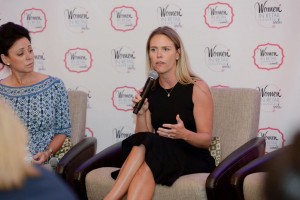Last week, I wrote about the “Power Panel,” a panel of executive women in the retail space who spoke during a session on leadership at the Women in Retail Leadership Summit in Miami last month.
Panelists included Miki Racine Berardelli, president, digital commerce and chief marketing officer at Chico’s; Gerri Elliott, director, Whirlpool, Bed Bath & Beyond, Charlotte Russe; Devon Pike, president, North America, Givenchy; and Alexandra Wilkis Wilson, co-founder and CEO, GLAMSQUAD.
During their session, the Power Panel shared personal experiences around five key leadership qualities that they believe are instrumental to their success. The five leadership qualities discussed were:
- leaders are expert communicators;
- leaders deal with failures gracefully;
- leaders have emotional intelligence;
- leaders are keen negotiators; and
- leaders pay it forward.
This article is the second in a five-part series that will recap the Power Panel’s take on these qualities. This week, I recap the Power Panel’s thoughts on leadership quality No. 2: leaders deal with failures gracefully.
For Berardelli, there’s a big distinction between making mistakes and failure.
“We need to make the differentiation between those two, because oftentimes we can get tripped up in a failure state when it’s honestly just a mistake,” she said. “We’re human; we make mistakes both at work and in our lives.”
Berardelli also explained that she’s a big believer in grace under pressure, as well as the importance of holding your head high despite any failures going on around you. Posture, in fact, is very important to Berardelli. She relayed a story about how her father was a stickler for posture and that when she was younger he would have her and her three sisters regularly stand against the dining room wall and test their posture.
“He told us [good posture] will lengthen your life,” Berardelli said. “And I hold that with me to this day.”
Good leaders also continue to learn about failure and how to deal with it as they grow, Berardelli said. “That never ends.”
For Devon Pike, a great way to think about failure comes from a TED Talk by Carol Dweck on the “growth mindset,” which says that we can grow our brain’s capacity to learn and solve problems. “The talk basically explains that everything we’re here to do is not just to accomplish, but to grow, so we can accomplish more,” Pike said.
Pike went on to say that she’s failed several times in her career, and that once you fail a few times, “you learn that it’s not that scary. Instead it proves that you have the initiative to take risks.”
Pike told the story of a mistake she made when she was interning in a department store. She transferred inventory — Swiss Army Knives — to one store because that store was selling the item really well. What Pike didn’t know was that that weekend a vendor-paid ad was running that was promoting the knives in all of the retailer’s stores. Pike said she told her boss about what she did, and subsequently spent the next couple of days driving from store to store, doing manual transfers, and getting all the knives back into the stores for the event.
“It worked out fine,” Pike said. “A couple of years later it gave me the confidence I needed when I was buying product to go back to the well multiple times when I was chasing a trend. And, later on, it gave me the confidence to take on a new challenge and launch a business at Ralph Lauren, which was a pretty daunting thing for me to do, especially since I was just a couple of years out of grad school.”
In general, Pike said, “if you believe in the person who is giving you the opportunity and you believe in yourself, why not take it on?”
Pike also discussed the Rugby Ralph Lauren retail concept that she was responsible for launching, which is no longer a business at Ralph Lauren.
“Rugby was an amazing business,” Pike recalled. “We had great business differentiation, great positioning, but ultimately it’s not around today, so someone could say, ‘That’s a failure.’ But actually, we achieved so much with that business — we carved out a place in the market. It was very clearly done. As a team we learned a lot, and the company was able to launch subsequent businesses based on that concept. So, it’s important to look at it as progressive, with everything building on top of the next.”
“If you don’t try it, you’ll never achieve it,” Pike said.
Next week, I’ll report on the Power Panel’s thoughts on how good leaders have emotional intelligence.


